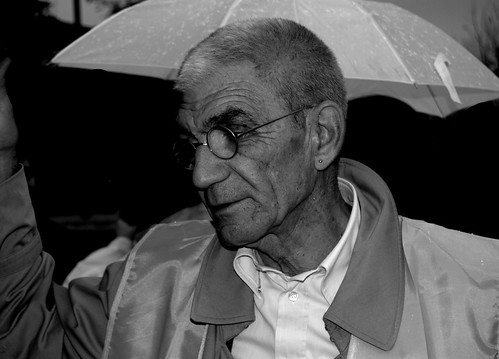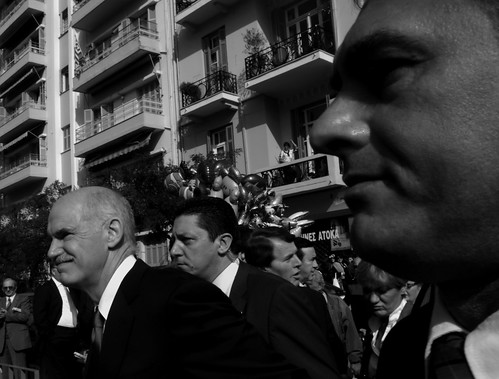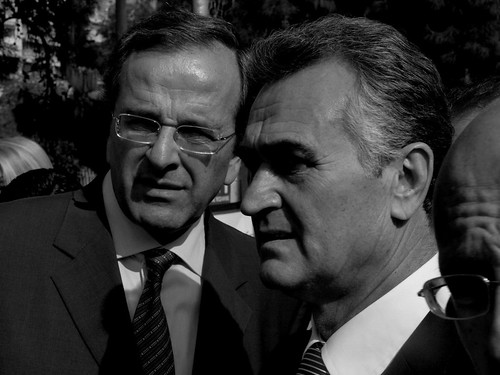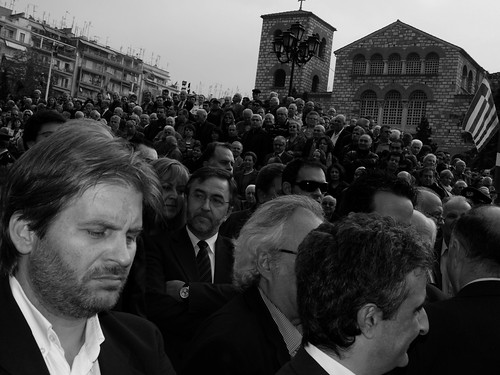With Greece set to go to the polls on Sunday the pressure on prime minister Giorgos Papandeou to avert electoral disaster for the ruling PASOK party grows ever stronger and so the sudden slew of government promises to the unemployed, mothers and pensioners over the last few weeks. Today brought the promise of
1000 euros for every unemployed Greek in the form of coupons which can spent on training and education. In addition
the state run ERT news service reported that mothers with childen under 18 who have the requisite number of national insurance stamps will be still able to retire early and comes hot on the tail of Athens promise to
give retirees an extra 300 euros in December.
Of course, none of this is new and very much marks business as usual as far as election campaigning is concerned. Just as PASOK has promised to fund training through coupons
Kostas Karamanlis's New Democracy administration also promised to give every school pupil entering junior high school 450 euros which could be used to buy a computer in the run up to 2009 general elections. However, such campaign pledges have been seen by much of the press and public as an attempt to buy votes by promising one - off payments in return for support on Sunday.
The coupon scheme in particular smacks of last minute panic and provides a classic example of how the Greek economy got into its present mess. Public money is desperately flung around in order to bolster support for the party in power leading to huge costs and minimal benefit for the country as a whole.
The idea of giving those out of work the chance to upgrade their skills is based on sound logic, at least at first glance but is doomed to failure for a number of reasons which the government is probably well aware of.
1 - First and foremost where is the money going to come from? Even if the EU provides 50% of the funding, with the official unemployment rate at 12% and rising fast this means hundreds of millions will be need to be spent to train the unemployed. Currently, the country is having
difficulty raising money to pay basics such as medical supplies to hospitals,
back wages to government employees and
even heating in schools.
2 - Who is going to provide such training and under what oversight? Much of Greece's private education and training is subject to few checks and inspections (I worked 20 years in various language schools and never witnessed a single inspection). Given such lax rules the possibility of abuse and fraud is ever present. The reality is that many such institutions only survive through connections with corrupt local officials and politicians who mandate who gets sent where. In such an environment the chances of getting the high quality training most modern economies demand is limited.
3 Lack of training and education is not the cause of the present unemployment crisis.Indeed unemployment is highest amongst the young who have far more qualifications than previous generations. The problem is not lack of skills but lack of businesses that can utilise the massive pool of talent already available.Put bluntly, the economy can only absorb a fraction of the educated youth entering the job market every year.
4 The availability of coupons will push up prices for those who do not qualify and wish to do training courses. The example of the one lap top per student scheme introduced last year by the conservatives is a recent example of how the private sector raised prices of computers to make the most of the coupon scheme implemented. While it allowed students and parents to buy PCs it also pushed up prices meaning that everyone else wanting to buy such equipment paid more.
5 As with the measures promised mothers and pensioners it is a one off measure that does not deal with more fundamental issues such as what is going to happen to the present wave of people made redundant when their unemployment benefits run out in six months time.
The economy is in free fall and w
ith two businesses closing for every one that opens the future for Greece's most vulnerable groups looks bleak with a bankrupt, mismanaged state leaving the poorest to fend for themselves. Likewise the electorate is rapidly losing faith in any political party to offer a way out of the impasse Greece finds itself in and promises of yet more money and funding is convincing ever fewer voters.










What both leaders choose to ignore was the enormous drop in turnout by Greek voters, in some cases 50% less than in previous elections in 2006 and the growing dislocation between the country's ruled and rulers. While both major parties made some gains the overall trend is one of ever intensifying disenchantment with the current political system. Less an endorsment of the country's politicians than an understanding that the country no longer controls its destiny, no matter which party is nominally in charge.
Tomorrow marks the 37th anniversary of the Polytechnic uprising which set in motion a chain of events that led to the overthrow of the military dictatorship that had siezed power in 1967. Every year students and others march in Greece's major cities in commemoration of those who died to restore freedom and democracy. The day is often used as a platform by political groups to demonstrate against unpopular government policies. This year's anniversary is likely to repeat this tradition and the presence of 7000 additional police officers in the centre of the capital is testiment to how worried the government is about the marches turning into something more violent.
Already there have been clashes in Athens between youths and the police around the university of Athens campus the scene of many of the violent confrontations during the 2008 uprising which caused billions of euros worth of damage.
Polytechniou day as it is known in Greece will prove to be an acid test over whether young Greeks in particular have accepted the massive cuts in public spending and job losses proposed by the European Union, European Central Bank and IMF.
Given the anger and frustration felt by much of the population over the continued economic crisis there is a very real possibility that a miscalculation by the authorities could have drastic consequences.